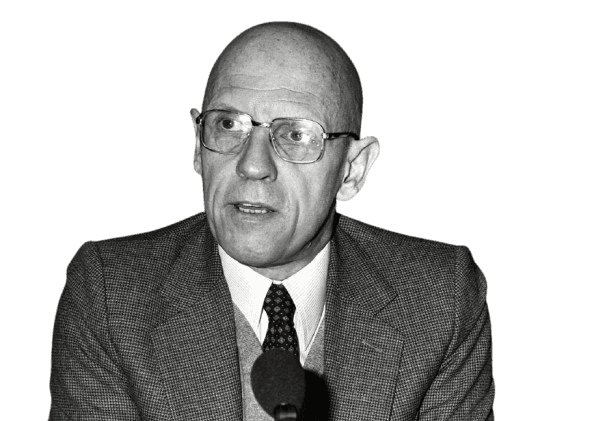Life and achievements
Early life
Paul-Michel Foucault was born on October 15, 1926, in Poitiers, in the Vienne département of west-central France, to a wealthy and conservative family. His father, Paul Foucault, was a surgeon, and his mother, Anne Malapert, belonged to a family of surgeons. Foucault was the second child of three and grew up in a reasonably well-off, upper-middle-class family. Although the family was technically Catholic, they were not religious, and Michel even attended as an altar boy for a short period without a solid religious interest.
Foucault's primary education was at the local Lycée Henri-IV, where he was a good student in French, Greek, Latin, and history but poor in mathematics. World War II and the subsequent German occupation of France also played a role in the early years of his life. Despite his family's disapproval of the occupation, they did not fight in the Resistance themselves. In this period, Foucault entered the strict Catholic school Collège Saint-Stanislas, where he was a brilliant student, although he described his time there as purgatory.
After finishing his secondary education, Foucault went to Paris in 1945 to study at the Lycée Henri-IV, one of the best secondary schools in France. Foucault was introduced to philosophy by Jean Hyppolite and became interested in existentialism and dialectic, Hegel, and Marx. Foucault did not follow his father's advice to become a surgeon but instead chose to study philosophy at the École Normale Supérieure from 1946. Here, he continued his interest in philosophy and psychology, which paved the way for the other fields that he would engage in later.
Legacy
Michel Foucault is one of the most significant and versatile thinkers of the modern era who has left a lasting impact on many fields of study and everyday life. His ideas on power, knowledge, and social structures continue to be relevant in philosophy, sociology, political science, and cultural studies. Foucault's idea of power as something distributed and present in all aspects of society was in contrast with the traditional view of power as concentrated in the hands of the few, thus altering the perception of power relations in different fields.
Foucault's work also focused on how societies, through institutions like prisons, schools, and hospitals, discipline people. He explained how power and knowledge are intertwined and how discourses form the social order and control people's behavior. This has resulted in essential questions being asked about the nature of knowledge and its function in the reproduction of power. Foucault's work has encouraged many scholars and activists to oppose the oppressive structures that exist in society.
Foucault's influence is not only felt in academics but also in social activism. His participation in penal reform and human rights activism proved that his theories could be applied in real life. Foucault died of AIDS-related illness in 1984, which also played a significant role in raising awareness of the disease. His partner, Daniel Defert, established the AIDS organization in his honor, which still fights for HIV/AIDS prevention and care. Foucault's biography and the body of his work are examples of how critical thinking can be used as a tool to transform society.
Milestone moments
Oct 10, 1926
Birth of Michel Foucault
Michel Foucault was born on October 15, 1926, in Poitiers, France, into a comfortably upper-middle-class family.
His father, Paul Foucault, was a surgeon, while his mother, Anne Malapert, belonged to a family of doctors.
Foucault was born into a conservative family of three children, two brothers and one sister, Francine and Denis, and was nicknamed Paul at school but preferred to be called Michel.
Foucault was raised as a Catholic but was not religious; he attended Lycée Henry-IV for his early education and was good in languages and history but poor in mathematics.
Oct 23, 1946
École Normale Supérieure
Foucault was admitted to the École Normale Supérieure in Paris at the age of 20 to study philosophy and psychology.
His educational process was associated with the existentialist Jean Hyppolite, who introduced Foucault to the works of Hegel and Marx, which determined the further development of the philosopher's views.
At this time, Foucault's talent and peculiarity emerged, thus opening the chapter of his remarkable academic life.
The period he spent at the École Normale Supérieure I prepared him for the kind of work he would do in philosophy and social theory.
Mar 18, 1961
The History of Madness is Published
Foucault's first major work was The History of Madness, which discussed the subject of madness in Western society from the medieval age to the present.
The book was praised for being detailed and innovative but found few readers at first.
The History of Madness presented Foucault's method of "archaeology," which is an approach to the analysis of the history of knowledge and discourse.
This work made Foucault famous and opened the path to his other important works.
Aug 18, 1970
Appointment to the Collège de France
Foucault joined the Collège de France, where he was given the chair of the history of systems of thought.
This position enabled him to carry out research and teach on power, knowledge, and social formations.
Foucault's lectures delivered at the Collège de France only added to his already considerable status as one of the most influential thinkers of his generation.
He worked and wrote some of the most influential books, such as Discipline and Punish and The History of Sexuality.
